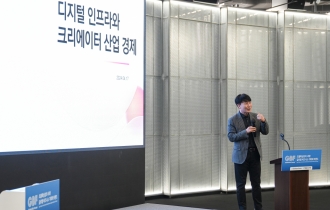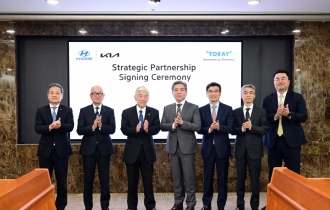[Q&A] BMW Korea CEO apologizes for engine fires
[THE INVESTOR] BMW Korea CEO Kim Hyo-joon on Aug. 7 officially apologized for a series of engine fires on its diesel cars, including its popular 520d sedan, during a press conference held in Seoul.
“We sincerely apologize for the concerns faced by our customers and government authorities here for the recent fire incidents. Our headquarters is taking it seriously, and has been sharing related information on a daily basis to solve the problem as soon as possible,” he said.

BMW Korea CEO Kim Hyo-joon
After the official apology, BMW Vice President of Quality Control Johann Ebenbichler explained that the fires occurred due to EGR cooler leakage and not because of faulty software. He noted that a voluntary recall began on July 26, which will affect 106,317 cars of 42 models from Aug. 20
During the conference, four BMW officials -- Ebenbichler, head of engine development Peter Nefischer, head of business and finance communications Glenn Schmidt and senior manager of governmental affairs Gerhard Woerle -- took the stage to answer questions from reporters.
The following are excerpts from the Q&A session.
Q: Can you please explain the main cause of the leakage from the cooling system?
Nefischer: The EGR module can be subject to leakages as a result of thermal fracture. This is something that we were aware of and are addressing the problem. But from the beginning, we could not link the leakage to the root cause.
Q: Is this a general problem of a diesel engine or is it specific to BMW?
Nefischer: To make it quite clear, there are no general issues or problems with the diesel engine. The technology is fine and it is something that we support. The problem is specifically due to this type of EGR cooling unit.
Q: Some experts say the explanation of malfunctioning cooler causing fires is not enough to explain the thermal events. What is your reaction?
Nefischer: Even after a leak, the cooler can still function and is able to bring down the temperature of exhaust gases to a maximum of 140 degrees Celsius. The root cause is due to the fact that we have a leaky cooler, and because of that we have sediments building up at the end of the cooler module. So even if there is a leaky cooler functioning, a single spot that has a higher temperature can lead to a thermal event. And that spot is the place where ERG bypass is located.
Q: Experts say that even with a properly working cooling system, some sediments can be found in the intake track. If this is true, how can you say that the root cause is the cooling system?
Nefischer: Finding sediments in the intake track is normal and they do not link (directly) to the problem. Due to fresh air coming in at this intake track, the temperature is around 100 degrees Celsius. So because of this low temperature there is no danger.
Q. Can you please tell us the exact timeframe that BMW was aware of the EGR module causing fires. Couldn’t you have started the recalls earlier?
Ebenbichler: In 2016, we first noticed small holes developing in the intake manifold. At that time we were not aware of why this was happening. By the end of the year, we established a task force to analyze this issue more closely.
Q. Why are so many thermal events occurring in Korea and not in other countries?
Ebenbichler: When we analyzed the data of June and July and compared the failures in Korea to other markets, we saw a similar failure rate.
Q. What does a different level of failure mean?
Ebenbichler: We have levels one to three. Level one is when you have small holes developing in the intake manifold. Level two involves small fires in the engine and level three, you have a larger thermal event that leads to fires at the front-end of the vehicle. And it is important to note that only 1 percent of level 3 failures have ocurred.
Q: How many engine fire incidents were there in Korea and worldwide so far?
Ebenbichler: Right now, we cannot provide exact numbers because the vehicles are still coming in from the field. We have a diagnosis team which analyzes everything so we can provide more details later.
This is not an issue specific to Korea. We are proceeding with the recalls with a higher priority here.
By Song Seung-hyun (ssh@heraldcorp.com)
EDITOR'S PICKS
- Trilateral talks acknowledge ‘serious’ slumps of won, yen
- Samsung C&T president makes her first business trip to Milan
- Seoul Business Agency CEO says SNS marketing essential for SME
- CJ Olive Young offers real-time translators for foreign visitors
- Hyundai Motor, Toray join hands for material innovation in mobility
- Paris Baguette debuts in the Philippines
- Samsung develops fastest DRAM chip optimzied for ondevice AI
- Amazon fuels e-commerce rivalry with free shipping campaign















